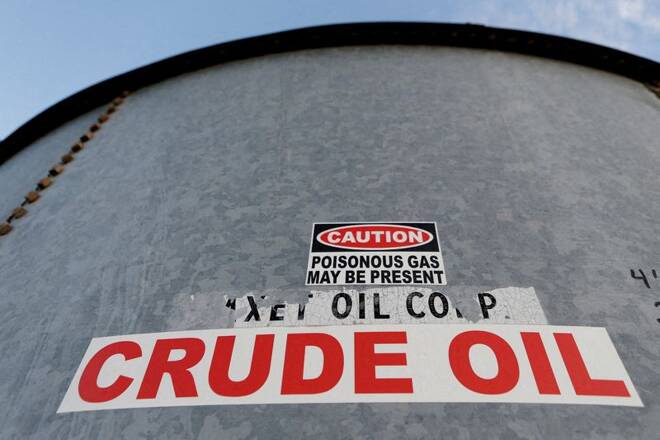Advertisement
Advertisement
Oil settles lower as halted Russian pipeline flows appear temporary, demand fears rise
By:
MELBOURNE (Reuters) - Oil prices dipped in early trade on Tuesday on the latest progress in last-ditch talks to revive the 2015 Iran nuclear accord, which would clear the way to boost its crude exports in a tight market.
By Laila Kearney
NEW YORK (Reuters) -Oil prices settled slightly lower on Tuesday after a see-saw session as worries that a slowing economy could cut demand vied with news that some oil exports had been suspended on the Russia-to-Europe Druzhba pipeline that transits Ukraine.
Crude prices have been under pressure for weeks as fears mounted that a recession could cut oil demand.
Brent crude settled at $96.31 a barrel, losing 34 cents, or 0.4%. U.S. West Texas Intermediate (WTI) crude settled at $90.50 a barrel, shedding 26 cents, or 0.3%. During the session, both benchmarks rose and fell by more than $1 a barrel.
Ukraine halted oil flows on the Druzhba oil pipeline to parts of central Europe because Western sanctions had prevented a payment from Moscow for transit fees from going through.
Flows along the southern route of the Druzhba pipeline have been affected while the northern route serving Poland and Germany was uninterrupted.
Oil initially moved higher on the pipeline news and expectations that the shutdown would tighten supplies, but prices reversed course as details became clearer around what caused the disruption and that flows were expected to resume within days.
“Considering the fact it is not the Russian side shutting down pipe, but the Ukrainian side, it would figure to be a situation that can resolved sooner rather than later,” Bob Yawger, director of energy futures at Mizuho in New York, said in a note.
Prices were pressured by talks of a last-ditch effort by European nations to revive the Iran nuclear accord. On Monday, the European Union put forward a “final” text to revive the 2015 Iran deal A senior EU official said a final decision on the proposal, which needs U.S. and Iranian approval, was expected within “very, very few weeks”.
Talks have dragged on for months without a deal.
Iran’s crude exports, according to tanker trackers, are at least 1 million barrels per day below their rate in 2018 when former U.S. President Donald Trump exited the nuclear agreement.
Oil is now down more than $40 from its peak following Russia’s invasion of Ukraine, which took Brent briefly to $139 a barrel.
U.S. crude oil inventories were also signaling slacking demand, according to market sources citing American Petroleum Institute figures. Crude stocks rose by about 2.2 million barrels for the week ended Aug. 5. Analysts had forecast a small 400,000-barrel drop in crude inventories. Official government data is due on Wednesday at 10:30 a.m. EDT. [EIA/S]
(Additional reporting by Alex Lawler, Sonali Paul and Emily ChowEditing by Louise Heavens, Mark Potter, Barbara Lewis and David Gregorio)
About the Author
Reuterscontributor
Reuters, the news and media division of Thomson Reuters, is the world’s largest international multimedia news provider reaching more than one billion people every day. Reuters provides trusted business, financial, national, and international news to professionals via Thomson Reuters desktops, the world's media organizations, and directly to consumers at Reuters.com and via Reuters TV. Learn more about Thomson Reuters products:
Did you find this article useful?
Latest news and analysis
Advertisement
